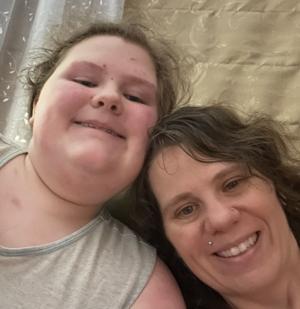MY DAUGHTER has multiple diagnoses, including but not limited to atypical Rett syndrome (a regressive form of autism), atypical ROHHAD (which is a rare life-threatening condition. ROHHAD is an acronym for rapid onset obesity, hypothalamic, hypo ventilation, autonomic dysfunction), diabetes, seizure disorder, intellectual disabilities, cognitive impairment, global developmental delays, paralyzing anxiety and PTSD from multiple traumatic experiences including medical procedures. I’m writing this as a concerned and worried mother/advocate with MS of a medically complex child with special needs.
Over the past year, we’ve seen many changes that have lead us to make one of the hardest decisions we have made so far as parents, which was to place our daughter on palliative care. This decision wasn’t taken lightly and was made alongside medical professionals, but we know it’s the best decision for our daughter. With cuts to Medicaid, individuals like my daughter will be impacted greatly and suffer dire consequences.

Medicaid is a critical lifeline for my daughter. My daughter’s medical, developmental and mental health issues require a large team of individuals to come together to work like a well-oiled machine. Medicaid provides her access to all of these essential health care services, whether it be specialists, a primary care doctor, visiting nursing, paramedics or the many different types of therapists that are needed to help maintain her skills.
Not to mention the ability to access all of her equipment needs (a walker, wheelchair, shower chair and a Hoyer lift to name a few), medical supplies to help support nutritional intake, and medications that are needed and crucial to survival while maintaining her quality of life. Medicaid also provides her with long-term palliative care that one day will most likely lead to hospice. Reductions in federal funding of Medicaid will force New Hampshire to have to make difficult choices.
It could mean cuts to crucial programs like Katie Beckett Medicaid (a special eligibility pathway for children under 19) and most likely will increase restrictions on eligibility, increase service limitations, increase and normalize institutionalization, increase waitlist time for waiver services, and more. People with disabilities who already receive services may see cuts in the number of care hours allowed, have fewer services covered, or be required to pay a new cost sharing option. For any family in our situation, cost sharing could come down to making decisions that could have catastrophic consequences.
Being unable to access services could lead to an increased risk of institutionalization for many individuals with disabilities in facilities with crippling restrictions. Clearly, resuming the practice of institutionalizing individuals with severe disabilities would be far more costly than saving Medicaid. As a society we have come so far and have worked so hard to support people with disabilities within the communities in which they reside.
It is untenable to face going backwards now. Places like Laconia State School no longer exist because it was proven to be ineffective and, dare I say it, dehumanizing! Institutions are far more costly to staff 24/7 than to maintain the Medicaid programs. Individuals with disabilities deserve a life that is no different than anyone else’s.
Ask yourself: Is this really what you would want for your family member or loved one? I know my answer is NO! Please carefully consider the dire consequences individuals with disabilities would suffer if cuts to Medicaid become reality and act accordingly to save this critical program..
Politics

Angela Fletcher: Consequences for those with disabilities and taxpayers

MY DAUGHTER has multiple diagnoses, including but not limited to atypical Rett syndrome (a regressive form of autism), atypical ROHHAD (which is a rare life-threatening condition. ROHHAD is an acronym for rapid onset obesity, hypothalamic, hypo ventilation, autonomic dysfunction), diabetes,...















